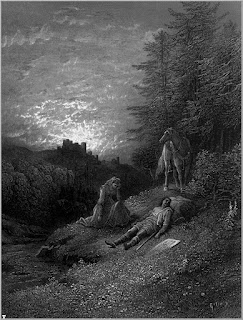Core Rules deep dive: damages, injuries and... death!
In this deep dive some insights about how a character can suffer damages, what is the kind of injuries from damage and what is the game mechanic which rule the death of a character.
Let’s start from the first topic: damage! A damage is anything affecting negatively a character, be it caused by either a weapon or a different cause like a poison or magic. In VI·VIII·X any damage is defined as a negative impact on a character’s stats. When a character suffers a damage, this means that one or more stats decrease and the character is in the position to act with a reduced score in that stat from the following turn; as a consequence the character gains the state of ‘injured’.
Now, let’s better focus on what an injury is in the VI·VIII·X game. According to the damage suffered, the GM defines what are the affected stats of the character (this happens only when it is not already defined in a rule, needless to say). The damage is exactly the same amount of the decrease in the related stats, the ratio is 1:1 (i.e. every point of damage is translated in one point of stat decrease). The application of the damage follows a simple rule: the decrease firstly applies to the US and, once the US is zero, eventually to the related KS. This means there could be the case where a PC takes a damage which lowers only the unknown stat: the GM might describe this situation to the player as a blow which hurts his character not in a ‘critical’ way. The other situation, when the character takes a damage which affects his KS, could be considered ‘serious’ since the character is dangerously approaching the score of zero in his KS.
The mechanic of injuries has been conceived in way to foster a tactical approach in any encounter or event that could generate a damage to a character. The rationale is that the player should pay more attention to the damage suffered compared to the ‘hit point approach’: in the later the only concern a player can have is when the score of the character’s hit points is approaching zero, otherwise the player doesn’t care too much whether the hit points are 50 or 40. When a damage directly lowers the PC’s stats, the player should consider the fact that in the following turn, his character could have a reduced stat thus leading to a lower chance to hit or defend or performing any other action related to the reduced score. This aspect combined to the mechanic of the sequence in the game is definitely a ‘game-changer’ compared to the most famous fantasy RPG and should lead any player to rethink the way to manage his PC whenever there is a risk of damage.
The dead-end point of injuries is whenever a damage is high enough to set the KS to zero: in such a circumstance the character gains a special state. According to the KS, the state is different: for Build is ‘death’, for Intellect is ‘coma’, for Control is ‘paralysis’ and for Empathy is ‘vegetative state’. All of them are temporary (even ‘death’). This means that for a predefined time frame the temporary state can be removed (by someone else and by means of magic or any other solution which enables an increase of the stat). This time frame lasts for a very limited number of turns (up to 2 minutes in the best case scenario): once a number of turns equal to the sum of the character’s KS and US has passed, then the state is not anymore temporary and becomes permanent.
Once the state is permanent, the character is useless since the permanent state cannot be modified (never say never anyway: this statement is referred to the ‘standard solutions’ provided by the rules, the GM has always the possibility to make up a situation where the stat can be recovered…). This rule is made so that a player can always have a chance to ‘save’ his character once he has reached a score of zero in a KS: this limited time frame before the score of zero is permanent is the solution.
Just to make any reader less worried about the mechanics presented today: there are rules which allows recovery of any loss of stat. These rules have been built both for natural healing (slow but safe) and magic healing (fast but treacherous…). Even in this case a balancing effect between the ways to recover points is present… but this is another topic! Stay tuned!

Comments
Post a Comment